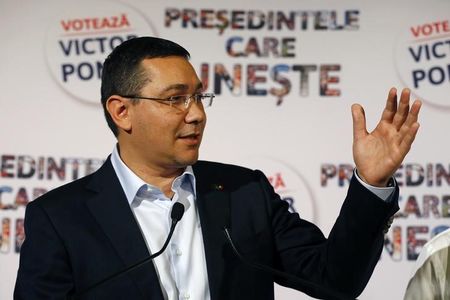By Luiza Ilie
BUCHAREST (Reuters) - Thousands of people rallied in cities across Romania on Saturday in support of compatriots living abroad who were turned away as they tried to vote in the first round of a presidential election on November 2.
Protesters in the capital Bucharest and the western cities of Cluj and Timisoara called for Prime Minister Victor Ponta to resign, saying he had failed to ensure all citizens could exercise their right to vote.
Romanians living in other European Union states and countries further afield who planned to vote at their embassies complained of long queues, while some polling stations ran out of a form that must be signed before a ballot can be cast. The Romanian embassy in Paris even called in French police as tempers flared.
"The mistakes made by the Ponta government are unacceptable, such as ... virtually forbidding the diaspora to vote," Radu Buda, 34, told Reuters from Cluj, where riot police estimated more than 5,000 protesters had gathered.
Holding banners that said "The Right To Vote" and "Solidarity For The Diaspora", live footage of the Cluj protest showed people chanting "Resignation" and "Free Romania".
Foreign Minister Titus Corlatean, who was told by Ponta this week to ensure the second round on November 16 runs smoothly or risk losing his job, said on Saturday there would be more voting booths abroad but no increase in the number of polling stations.
Ponta, a leftist, won the first round of the poll and is expected to beat Klaus Iohannis, an ethnic German mayor backed by two centre-right opposition parties, in the run-off.
Analysts estimate there are up to 4 million Romanians living abroad, primarily in richer western Europe. Although only a fraction of them vote in elections, they have the power to influence the outcome.
Outgoing centre-right President Traian Basescu won by a razor-thin margin of 70,000 votes in 2009 after trailing in opinion polls, largely because he secured more than three-quarters of the 148,000 ballots cast by the diaspora.
Data from the central election bureau showed 160,056 Romanians voted abroad on Nov. 2, with Iohannis winning 46 percent against Ponta's 16 percent.
Overall, Ponta, a former prosecutor and amateur rally driver, won 40.4 percent of the first round vote, 10 points ahead of Iohannis.
A Ponta win could bring more stability to the country of 20 million after a painful recession and years of bickering between him and Basescu, but may also raise concerns about the independence of the judiciary.

Romania joined the European Union in 2007 but remains its second poorest and one of its most corrupt member states.
(Editing by Catherine Evans)
